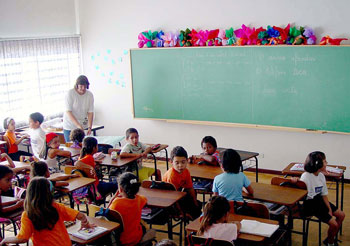Prescription for raising children

A study by the Mapping America project has found that children have fewer behaviour problems when they live with both biological parents and attend religious services frequently.1,2
“Children who worship at least weekly are least likely to have their parents contacted by school teachers or administrators about school-related problems,” the report said.2
Those who live with both parents and frequently attend religious services are five times less likely to repeat a grade, and more likely to be cooperative and understanding of others’ feelings.
The data were collected from a survey sample of 102,353 children and teens aged 6 through 17 in all US States. This sample represented nearly 49 million young people nationwide.
It was announced that: “Parents of these children report less stress, healthier parent-child relationships, and fewer concerns about their children’s achievement. These differences hold up even after controlling for family income and poverty, low parent education levels, and race and ethnicity.”1
There’s a very good reason for the researchers emphasizing that point. That’s because, as the report points out:
“Some social scientists even contend that family structure and religious participation are only linked to developmental outcomes because of their association with socioeconomic disparities.”2
This report, however, dispels that notion—a notion popularly proclaimed by the world’s secular media. This report shows that the positive impact of living with both parents, coupled with regular attendance at worship services, just cannot be ignored. For example, when displaying a bar graph comparing percentages of children who repeat a grade, the report’s authors were unequivocal in their language (emphasis added):
“Children from intact families who worship frequently are least likely to repeat a grade. Note the dramatic difference between intact and non-intact families.”2
That would hardly be a surprise to anyone who knows what the Bible says about families. The biological family is God’s prescription for the proper and best way of raising children. The fact that in the beginning God made but one man and one woman shows that He intended that marriage should be monogamous and indissoluble (Genesis 2:18; Matthew 19:3–9 (citing Genesis 1:27 and 2:24 as real history written by the Creator); see also <creation.com/monogamy>). And it is within this setting that God blessed the world’s first parents and said, “Be fruitful and increase in number … ” (Genesis 1:28). Cf. “Children are a heritage of the Lord” (Psalm 127:3–5).
One purpose of God in instituting families is seen in God’s instructions to parents to teach their children about God and His Word (Deuteronomy 4:10, 6:6–7), in order to produce “godly offspring” (Malachi 2:15). When parents follow the Manufacturer’s instructions it is little wonder that these children have a huge advantage.
The Mapping America project report, however, includes this somewhat sobering snapshot of young America:
“Despite the developmental advantages associated with an intact two-parent family and religious training, the survey shows that nowadays less than half of all American children between 6 and 17 years of age—45 percent—live with both biological parents and attend religious services weekly or monthly.”2
In the Bible, one of the roles of the prophets preparing for the coming of Christ, was “to turn the hearts of the fathers to their children, and the hearts of the children to their fathers” (Malachi 4:6 (NIV)). Luke, quoting this verse adds, “to turn the disobedient to the wisdom of the righteous—to make ready a people prepared for the Lord” (Luke 1:17).
There could be a message there for today’s parents!
References
- LifeSiteNews.com, New Study Find Children Who Live with Biological Parents and go to Church Fare Best Developmentally, <www.lifesitenews.com/ldn/2008/dec/08121702.html>, 17 December 2009. Return to text.
- Zill, N., and Fletcher, P., Special Report: National Survey of Children’s Health finds Intact Family and Religious Participation are associated with Fewer Developmental Problems in school-age children, <http://downloads.frc.org/EF/EF08L48.pdf>, 16 December 2008. Return to text.

Readers’ comments
Comments are automatically closed 14 days after publication.